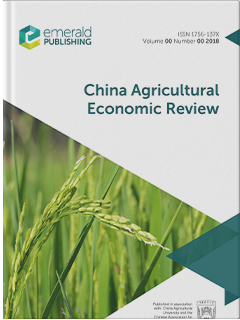The influence of clan social capital on collective biogas investment
IF 4.6
2区 经济学
Q1 AGRICULTURAL ECONOMICS & POLICY
引用次数: 4
Abstract
PurposeThe purpose of this paper is to examine the influence of clan social capital on the willingness to pay (WTP) and WTP value for collective biogas investment.Design/methodology/approachUsing the Heckman two-stage model and a dataset of 1,265 representative observations from three provinces in Central China collected in 2019, this paper utilizes the contingent valuation method to estimate households' WTP value for collective biogas investment. The paper also explores the heterogeneity between households with different clan governance mechanisms and village governance structures.FindingsThe results indicate that clan networks and trust were likely to improve farmer households' WTP, while clan trust and norms could improve their WTP values. For clans with councils and for clans that can influence the decision-making of village committees, their members were more likely to be influenced by the social capital of their clans to pay for collective biogas investment.Originality/valueThis paper focuses on the WTP and WTP values of households for collective biogas investment, which is often neglected in the research. This paper suggests that clans can be used as a medium to urge households to increase their collective power to reduce carbon emissions and climate crises. The findings empirically contribute to efforts to reduce rural carbon emissions.宗族社会资本对集体沼气投资的影响
目的考察宗族社会资本对集体沼气投资的支付意愿和价值的影响。设计/方法/方法利用Heckman两阶段模型和2019年收集的来自中国中部三个省份的1265个代表性观测数据集,本文利用或有估值方法来估计家庭集体沼气投资的WTP价值。本文还探讨了不同家族治理机制和乡村治理结构的家庭之间的异质性。研究结果表明,家族网络和信任有可能提高农户的WTP,而家族信任和规范有可能提高其WTP价值。对于有理事会的部族和能够影响村委会决策的部族,其成员更有可能受到部族社会资本的影响,以支付集体沼气投资。原创性/价值本文关注的是家庭对集体沼气投资的WTP和WTP价值,而这在研究中往往被忽视。本文建议,可以将部族作为一种媒介,敦促家庭增加集体力量,以减少碳排放和气候危机。这些发现从经验上有助于减少农村碳排放。
本文章由计算机程序翻译,如有差异,请以英文原文为准。
求助全文
约1分钟内获得全文
求助全文
来源期刊

China Agricultural Economic Review
AGRICULTURAL ECONOMICS & POLICY-
CiteScore
9.80
自引率
5.90%
发文量
41
审稿时长
>12 weeks
期刊介绍:
Published in association with China Agricultural University and the Chinese Association for Agricultural Economics, China Agricultural Economic Review publishes academic writings by international scholars, and particularly encourages empirical work that can be replicated and extended by others; and research articles that employ econometric and statistical hypothesis testing, optimization and simulation models. The journal aims to publish research which can be applied to China’s agricultural and rural policy-making process, the development of the agricultural economics discipline and to developing countries hoping to learn from China’s agricultural and rural development.
 求助内容:
求助内容: 应助结果提醒方式:
应助结果提醒方式:


